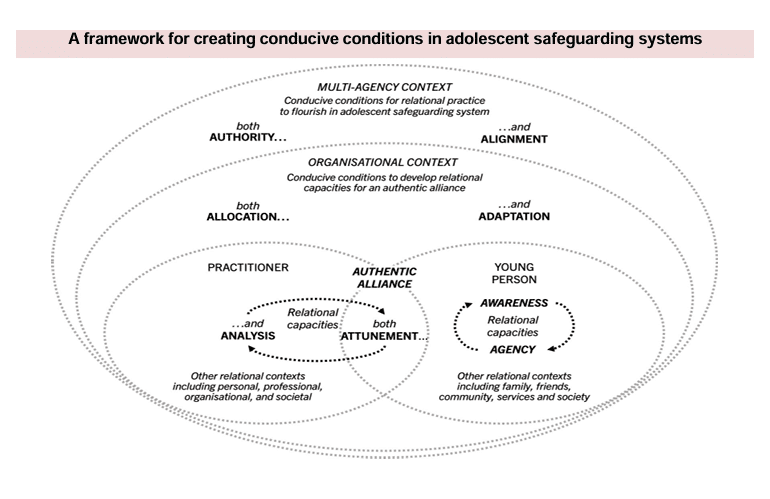Research on the impact and importance of relationships
Key Learning from research
In our previous blog and this webinar we explored what care experienced young people say about their relationships. They were clear: relationships matter deeply to their quality of life and well-being. Few would disagree, but those who work with care experienced young people can find putting relationships first difficult. They can feel they don’t always have the time, capacity or permission to priorities relationships.
In this blog we pull together some resources to further strengthen the case as to why relationships need to be at the center of how we think and act.
The Resources
The Relationships Project draws on evidence and learning from across many areas to outline why relationships matter, what great relationship-centred practice looks like and the impact it can have. It brings together thinking about principles, behaviours, knowledge and skills, organisational conditions and external conditions that can support or inhibit relational working.
- Their Case Maker assembles the evidence base for putting relationships first. It is a brilliant place to find lots of key facts and stories to equip us all to make a compelling (perhaps irrefutable!) case for relationship-centred practice
-
- Poster of key statistics on the impact relationships can have
- The Relationships Map is a directory of individuals and organisations working towards a more relationship-centred future
- The Permissions game invites you to explore the rules and norms that influence how we work and what we prioritise via a series of engaging scenarios
- This 5 step guide helps you put in place the conditions for relationships to flourish
- Stories of change such as the work in Barking & Dagenham to return social care to its radical relational roots
Changing Futures Northumbria is looking at new ways of working with and supporting people experiencing hardship and multiple, overlapping disadvantages such as homelessness and addiction. Their work starts from the idea that we need to understand people, not simply assess them. This starts by focussing on building a meaningful relationship rather than referring people to different services. Their research shows the transformative impact this can have.
- They have developed a method of working based on relationships which they call the Liberated Method. They want all public services to work in a relational way – to move away from the current situation where many people don’t get the help they need because of arbitrary targets, restricted funding and risk avoidance.
Lots of research reviews synthesise evidence on the importance and impact of different aspects of relationships for care experienced young people:
- National Institute for Health and Care Excellence evidence review on interventions to support positive relationships for looked after children and care leavers
- The Scottish Independent Care Review Evidence Framework literature review on trusting relationships and evidence review on relationship-based practice
- Iriss care experience and friendship evidence summary
- Iriss evidence summary on supporting positive relationships for children and young people who have experience of care
- Celcis care experienced young people’s relationships with workers: a review of the literature
- SafeLives literature review on the experiences of Intimate Relationships for Care Experienced People
Youth work researchers Colin Michel & Luke Billingham have developed a thought-provoking framework for thinking about creating conducive conditions for relational practice. This highlights the need for an authentic alliance between the young person and the practitioner, in which the practitioner is both demonstrating attunement to the young person’s needs and context, and analysis of the situation drawing on their professional knowledge. It also reflects on how the organisational and multi-agency context can enable such authentic alliances to be built.

How might you use these resources?
You could use these resources to deepen your understanding of how putting relationships first can make a difference to what you do – use this to kickstart a call to action to work more relationally in your organisation. Jump in and make a small change. Go for it!
Some ideas for action:
- With colleagues discuss and debate what you individually and collectively think is the narrative in your organisation for why investing in relationships leads to better outcomes
- Appraise where the gaps are. What would help you strengthen this narrative even more? Can you use any of the resources in this blog, or evidence you already have specific to your young people, to help strengthen the rationale?
- Listen to the podcast, explore the stories in the change maker, play the permissions game or pick one of the research review resources and have a book club session with colleagues to discuss how what you read resonates with the work you are doing
Where can I find out more?
Below you can watch the recording of our webinar accompanying this blog.
This blog is part of a series of resources drawing on the peer learning programme and containing young people’s views, evidence and case studies of why working relationally is important for practice with care experienced young people.
